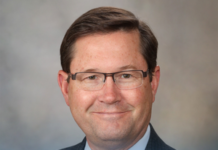
Interview by Kemp Harr
Doug Chadderdon is the second-generation leader of the retail flooring business that is today Great Floors, a $200 million, successful chain of 20 floorcovering stores across the Northwest, ranking 19th on the 2020 Floor Focus Top 100 retailers list-and retail is only a fourth of its overall flooring business. The business also boasts robust commercial and builder arms. Through his 40 years in flooring, Chadderdon has been a significant force of advancement in the industry, founding the CarpetsPlus buying group and serving as the second president of the elite National Floorcovering Alliance. Continue reading to learn more about Chadderdon’s circuitous path, which led him out of and then back into independent floorcovering retail, as well as how he’s structured his business for ongoing success, even in today’s challenging environment.
Q: Growing up in a family that owned a retail flooring business, why did you first pursue a banking career?
A: I graduated from college in 1981, and interest rates and unemployment numbers were high, so I enrolled in graduate school. After that, I was in Seattle, where the employment market was better than Idaho, so I accepted a job in banking and did that until the start of 1992.
Q: Your dad, Keith, started the family business out of the back of the car, and now it has 20 retail stores and a substantial commercial and builder business with total revenues in excess of $200 million. Take us through a couple of the big milestones that led to this to this successful growth.
A: When I left banking in 1992, I moved to Boise to open a fifth store within my parents’ flooring company. My wife grew up in Boise, so it was a happy move for her. Sadly, my dad passed in mid-1993. I moved home to Coeur d’Alene to help my mother and then, with my three sisters, bought the business from her.
Gary Schwartz had sold his Carpet Exchange business to Shaw, and he was a big influence in getting the people at Shaw to talk to me. In 1997, we sold the business to Shaw, as it had entered the retail business as part of a vertical growth strategy. We were the last acquisition Shaw made in that area, and in 1998, all of the retail stores were spun off to Carpet Max. I became the regional vice president for Carpet Max and had Washington, Oregon, Idaho and Montana until 2000.
In 2000, Carpet Max changed its name to Flooring America, but it was too late, and they filed bankruptcy in June of 2000. In July of that year, we repurchased the assets of the company I had sold, as well as those of the Carpet Exchange, which had a very successful business in western Washington. That was our biggest growth opportunity, and sales in 2000 were in excess of $40 million.
Q: Great Floors is a great name. How did the company end up with it?
A: While I was employed by Shaw, I reported to Vance Bell. It was a great experience, and I learned a great deal about business from Vance in a brief time. I had been curious about Shaw’s branding strategy for retail, and Vance shared some names they had considered for a national brand. One of those names was Great Floors. I asked Vance if we could use the name, and he, thankfully, agreed to allow us. We made the conversion from Carpet Center and Carpet Exchange after I took a builder customer to a Seattle Mariner game, and he asked where he should buy his hardwood flooring. I said, “Buy it from us.” He said, “I buy all my carpet from you, but you aren’t wood guys.” That is when I decided to change the name. It was not only expensive but personally agonizing. My parents had created Carpet Center, and Gary Schwartz had built Carpet Exchange into one of the best brands in the country. But I knew our customers needed to be comfortable that we could handle all flooring products. So a few million dollars and a national trademark later, we became Great Floors.
Q: You were the second president of the NFA. How did you get involved, and why aren’t you part of that group now?
A: My dad and Gary Schwartz were good friends. Gary was a founder of the National Floorcovering Alliance and asked my dad to join, so he did. Unfortunately, my father died before he could attend a meeting.
When I attended my first meeting in January 1994 in Atlanta, I think I was the youngest person in the room. People like Gary, Fritz Munzinger of Baker Brothers in Phoenix and Sam Prizant from Pittsburgh were very kind to me. I had energy then and was willing to spend some personal time on behalf of the group with vendors and also recruiting new members to the group. I believe we went from 12 members to 25 members in that two-year period. Like others that had sold to Shaw, I resigned from the group to avoid conflict because of the Shaw ownership. I still miss the group and people like Sam Roberts. I always learned something from those meetings. It was a wonderful experience for me.
Q: You were also the founder of CarpetsPlus. How did that come about?
A: That is also tied to the NFA. While president, I met Ron Dunn when he was at Mohawk and assigned to the NFA account. Ron and I became friends, and he was instrumental in helping me recruit some really good members to the NFA. Ron was really good with dealers, and he knew he could help a group of dealers if he had the opportunity. He and John Logue decided to go out and try a new buying group. A few of us invested, like Don Mercer, the former president of Mohawk. In my files from the NFA, we had some names for that buying group. One of those was CarpetsPlus. I shared it with Ron, and he liked it.
Of course, things went well quickly for Ron and John, and while I was at Carpetmax, I arranged a meeting for Ron to meet Carpetmax management. They agreed to the sale of CarpetsPlus. We know what happened to Carpetmax/Flooring America, and, like me, Ron and John bought back CarpetsPlus, and the rest is a great American business story. I’m very happy for him.
Q: In the retail sector, the RSA (retail sales associate) is a key driver in what the consumer ends up buying. How do you ensure that he/she takes care of the consumer by recommending the right product but also supports Great Floors from a margin perspective?
A: We have a complete product offering, but our strength is in our bestsellers. These are items we highlight in our own displays that are private labeled. Whether hard or soft surface, our staff has confidence in the value to the customer that these products offer. Because we stock them and have availability, both the retail sales associate and the customer have confidence when choosing one of those items.
Of course, those are not the only items we sell, but they reinforce the value of all the other items we offer. Our vendor partners play a key role in product training, and we rely on them to help inform our staff on new introductions. We also have Great Floors University, which is our online in-house training program. It is very comprehensive, so our associates have access to all the information they will need to answer a consumer’s question or need.
Q: How has the threat of the virus changed the retail business?
A: When the virus hit, it was very disruptive. Our 17 Washington locations were closed, except for essential installations, which were limited to government projects and subsidized or assisted living facilities. It was really challenging. Accessing PPE materials was also difficult. We have caught up now, but it was a challenge to have sanitized surfaces, plexiglass barriers, face masks and all the rest. Seattle had the first recorded case of COVID-19 and still is reeling from the effects of the tragic deaths that occurred and caught health officials and the citizens off guard. Our staff has been absolutely amazing through all of this. We had to put well over 200 people on standby for several weeks, but they have come back with a better attitude and spirit than I could have imagined. Americans really are remarkable, and, fortunately, we employ a bunch of people that love a challenge.
Today, for consumers, the first message we have to get out is that we practice safe measures in the store and in the home. We have to give the consumer that assurance from the get-go. Consumers are gathering their information online now, almost down to final product selection, and once they decide what retailer they want to go to, they come in with their wallets open in their hands, and they pretty much have their minds made up.
Our job is to make sure they have made the right choices for their applications. They have gathered a lot of information on the Internet, which means that we have to not only tell them we have all of this-this huge assortment-but go right into the specifics of our knowledge about each product. Providing assurance both on safety side and information side has really become critical. We only have one shot now-it used to be two or three stores they’d go to-but today we have one chance to close the deal.
Q: What keeps you up at night?
A: Right now, it is another flare-up of COVID. If that doesn’t happen, I think the U.S., and especially the flooring sector, will be okay. Americans are really focused on their homes right now, and I believe we have a nice three-year run ahead of us for new home construction expansion. That is the biggest part of our business today.
Q: Most economists are telling us that the commercial market is going to be soft in 2021, which historically has been your biggest sector. What are your plans for shoring up that business during the downturn?
A: Our annual breakdown is generally $100 million commercial, $50 million builder and $50 million retail. For 2020, we expect the builder to rise to $80 million and commercial to be flat.
Looking ahead, the office sector is going to be tough. Fortunately for us, we are not strong in that area. K-12 schools and higher ed will be tough until states get control of their budgets. I do think there are limited bright spots. In Seattle, the tech sector continues to expand, and there are a number of projects in that market that will happen in 2021. Amazon, Microsoft, Apple, Google and others have large projects going in the Seattle market. Some of our other markets, like Boise, have had so much new home growth in the last three years that the commercial buildout to support those neighborhoods can’t be stopped. I think there will be selective opportunities, but, in general, we expect commercial sales dollars to be down 15% to 20% in 2021 but better in 2022.
Q: Why is your headquarters in Coeur d’Alene, Idaho when most of your business is in Washington state?
A: Both of my children were born in Seattle, but I wanted to raise them in Coeur d’Alene. Coeur d’Alene is a four-hour drive or one-hour flight to Seattle, so I can be there easily as needed. Coeur d’Alene is also more affordable, so it is actually a recruiting advantage for us. People with a family really like the idea of living here. Of course, younger people like living in a city with more opportunities for entertainment, but it has worked out well for us. We have a very talented management staff here in Idaho and have a lot of room for growth with the current team.
Q: How are you navigating the shortage of adequately trained installers?
A: Other than COVID, installation is our biggest challenge. I have flipped 180 degrees from ten years ago. Back then, we only wanted subcontractors. Today, I am looking to make employees of every talented, well-trained installer we can find. Our decision has been to hire and make them employees and give each one an apprentice or two to train. So far, so good.
Q: How are you preparing the company for your eventual retirement?
A: I just turned 61 and still love the business and the team of people I get to work with. The truth is, I handed the day-to-day operations over to Mike Nelson three years ago. He is our executive vice president and will be the president at some point. He has done a great job leading the team and educating me! I am now focusing on allocating capital, making sure we hire the best people and looking for expansion opportunities. Mike is running the day-to-day business with the team he has put together.
Q: Who are your mentors, and what did they teach you?
A: That is a special question for me because I have been blessed to have so many mentors. My mother taught me how to manage money. If you pay your bills on time, people really want you to succeed. She was great with money management, and that is the most important quality in a CEO.
My dad taught me about merchandising and taking care of the customer.
I watched Gary Schwartz closely. He is still the best buyer I have known. He really knew how to pick a winner and to create a win-win situation for the vendor and himself.
Julian Saul taught me how to be a nice guy and still be successful. When I was young, I thought the other party had to lose. That is not at all the case in a long-term business relationship.
Q: Your mom worked in the business with your dad and then went on to become a state legislator. Fill us in on how that transpired and what motivated her to get into politics.
A: She is just amazing. When she told me she was going into politics, I thought she was crazy. In fact, she just wanted to give back to a state and community that had given her and her family so much opportunity. She had no agenda and was not interested in a particular party’s interest unless it was good for all. She had a party affiliation but managed to stay truly independent in her thinking on legislative matters. She served our state well for four terms, long after most people are simply enjoying retirement. I still have people thank me every week for the things she did while in office. She is a true inspiration to me, and I try to have dinner with her every Sunday so that I can pick her brain. She’s a smart lady.
Q: Recognizing that people are what make a company successful, what do you look for in a candidate when you consider adding them to your team?
A: We just created a new position, and we looked for a person with drive. A self-starter who doesn’t need much guidance-but someone who will take guidance. A strong moral compass is important to me. I don’t want to win business in an unethical way. Life is too short to spend with a corrupt person. Mostly, we look for smart people. Of course, everyone I meet seems smarter than me, so that is easy. Seriously, it doesn’t require a superior education, just superior intellect.
Q: Tell us what you do for fun when you aren’t focused on growing Great Floors.
A: I like to snow ski. My wife and I have a home in Sun Valley, and we both ski often and do some fly fishing. I do enjoy playing golf, but living where I do, summers are short, so golf only lasts about 90 days. I have two golden retrievers that I enjoy, and, of course, nothing is better than getting together with both of my children.
I am blessed because I consider my work fun, as well.
Copyright 2020 Floor Focus
Credit: Source link































